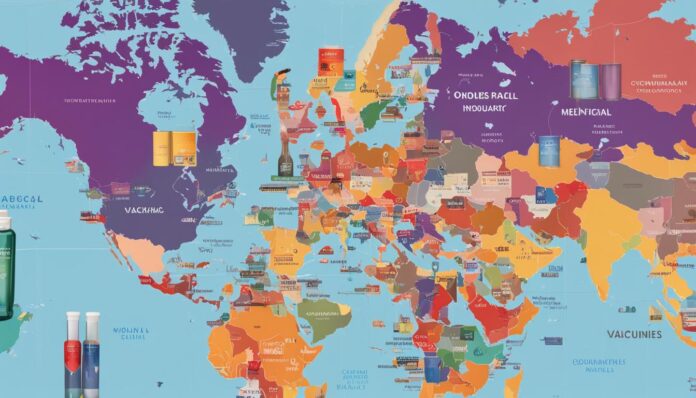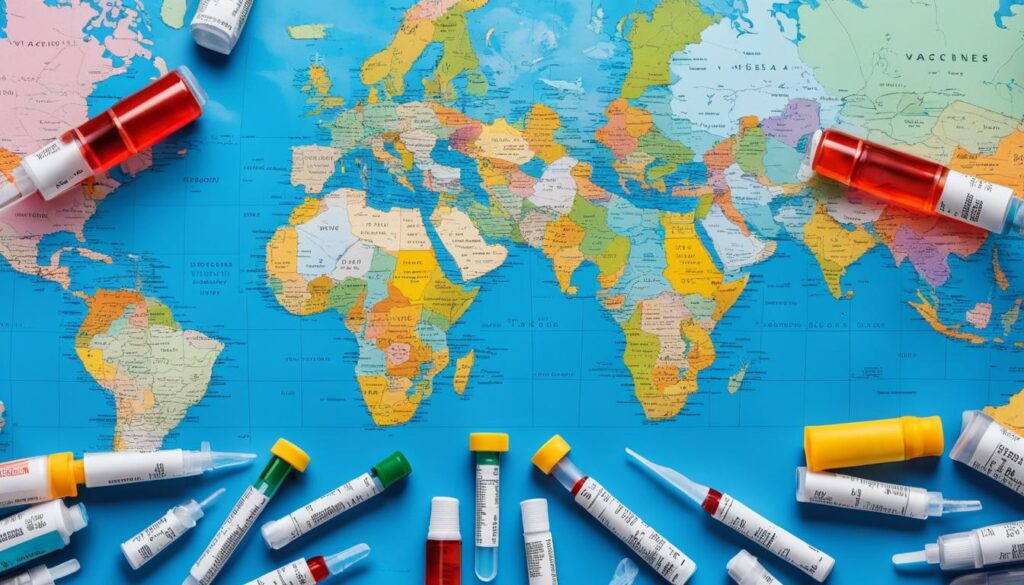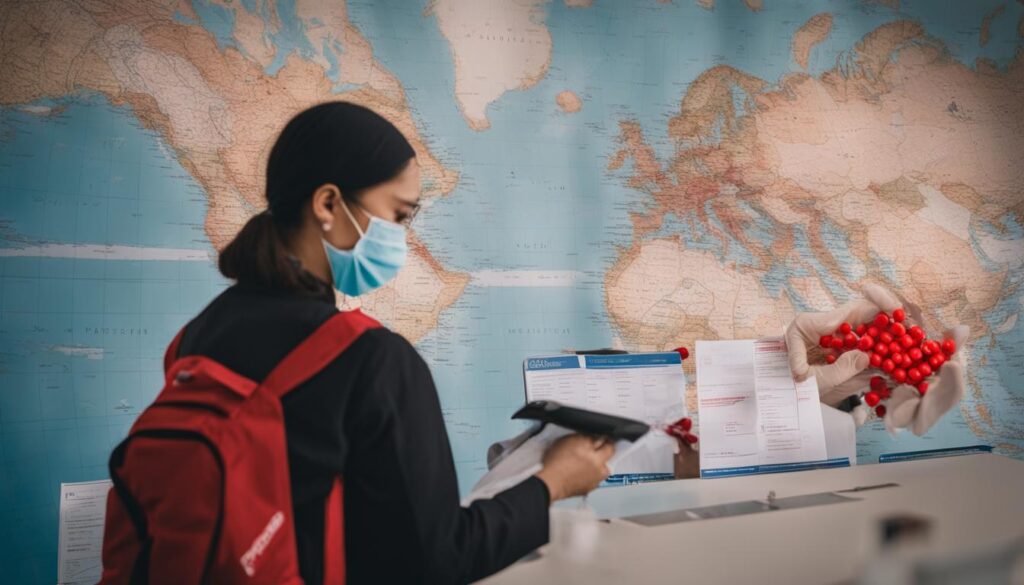Planning your next adventure can be an exciting time, but it’s essential to ensure you’re sufficiently vaccinated before embarking on your journey. With the right immunizations, you can ensure your health and safety while traveling abroad. What vaccinations do I need for travel? In this section, we’ll cover everything you need to know about essential travel vaccinations, immunization requirements for travel, and travel vaccine recommendations to help you stay informed and protected.
Before you set off on your next adventure, it’s important to understand the necessary vaccinations required for your destination. From yellow fever to measles, different countries have specific vaccination requirements for travelers entering their borders. Failure to comply with these regulations could result in significant travel disruptions, including delays and even denied entry.
To ensure a smooth and hassle-free journey, you should consult with a travel medicine specialist to receive personalized advice regarding your travel vaccinations and immunizations. The right vaccines can not only protect you from potentially life-threatening diseases but also ensure you’re compliant with any necessary requirements.
Proper planning is also essential when it comes to travel vaccinations. Depending on your destination, some vaccines require multiple doses spread over several months. Our timeline planning guide will help you schedule and prepare for your necessary immunizations before your departure.
In the next sections, we’ll dive deeper into understanding travel health recommendations, common vaccination requirements for international travel, and vaccines for common travel-related diseases. We’ll also discuss additional precautions, such as those necessary for adventure travelers, and offer guidance on preparing and maintaining your vaccination records. Stay informed and protected to ensure a healthy and enjoyable journey.
Understanding Travel Health Recommendations
When planning for your upcoming travels, it is crucial to understand the travel health recommendations provided by experts to ensure a safe journey. These recommendations include the necessary travel immunizations and recommended vaccines for traveling to specific destinations that may pose a higher risk of certain diseases.
For example, if you plan to visit Africa, the CDC recommends getting vaccinated for yellow fever and taking medication to prevent malaria. Meanwhile, those traveling to Southeast Asia should consider getting vaccinated for Japanese encephalitis and taking precautions against dengue fever.
It is essential to consult with your healthcare provider or a travel medicine specialist for personalized advice on the necessary vaccinations for your travels, especially if you have pre-existing health conditions or are traveling with children.
Key Points to Remember
- Travel health recommendations provide essential information on necessary travel immunizations and recommended vaccines for traveling to specific destinations.
- Consult with a healthcare provider or a travel medicine specialist for personalized advice on the necessary vaccinations for your travels.
Stay informed and protect yourself with the right travel immunizations for your upcoming adventures.
Common Vaccination Requirements for International Travel
When traveling internationally, you may encounter specific vaccination requirements for certain countries. These vaccinations are necessary to ensure the health of both locals and visitors, so it’s important to be aware of them before you depart on your journey. Failure to comply with vaccination requirements can lead to refusal of entry or delays in your travel plans.
The most common vaccination requirements for international travel include:
| Vaccine | Disease | Countries Requiring Vaccination |
|---|---|---|
| Yellow fever | Yellow fever virus | Most countries in sub-Saharan Africa, parts of South America, and a few countries in Central America and the Caribbean. |
| Polio | Polio virus | Countries with ongoing polio transmission. |
| Typhoid fever | Salmonella Typhi bacteria | Countries with poor sanitation and hygiene. |
| Hepatitis A | Hepatitis A virus | Countries with poor sanitation and hygiene. |
| Meningococcal disease | Neisseria meningitidis bacteria | Countries in sub-Saharan Africa during the dry season. |
It’s important to note that vaccination requirements may change frequently based on disease outbreaks or other health concerns. Be sure to check with the embassy or consulate of the countries you plan to visit to confirm the most up-to-date vaccination requirements.
To ensure you are fully protected during your travels, make sure to schedule your necessary vaccinations well in advance.
Vaccines for Common Travel-related Diseases
Traveling to new destinations exposes you to a variety of different environments and potential health risks. Certain diseases are more prevalent in specific regions, making it crucial to protect yourself through immunization. Below are the recommended vaccines for traveling:
| Disease | Vaccine |
|---|---|
| Typhoid Fever | Vi and Ty21a vaccines |
| Hepatitis A | Havrix and Vaqta vaccines |
| Hepatitis B | Engerix-B and Recombivax HB vaccines |
| Malaria | Antimalarial medication |
| Yellow Fever | YF-Vax and Stamaril vaccines |
| Japanese Encephalitis | Ixiaro vaccine |
In addition to these vaccines, other vaccines may be recommended based on your travel destination, length of stay, and planned activities. Consult with a travel medicine specialist to determine the most appropriate vaccines for your travels.
Remember to receive recommended vaccines for traveling and stay protected during your journey. Your immunization needs may vary based on your unique travel itinerary. Travel prepared and return home safely.
Additional Precautions for Adventure Travelers
If you’re seeking an adrenaline rush during your travels, it’s important to take extra precautions to protect your health. Adventure travelers engage in activities that may put them at a higher risk of certain diseases than regular travelers. Here are some additional precautions and vaccinations to consider before embarking on your next adventure.
Rabies
Rabies is an infectious disease that can be transmitted through the saliva of infected animals, such as bats, raccoons, or dogs. It’s prevalent in many countries, especially in developing parts of Asia, Africa, and South America. If you’re planning to participate in activities that involve close contact with animals, such as hiking, camping, or volunteering with animal rescue organizations, it’s recommended to get vaccinated against rabies. Apart from vaccination, other preventive measures include avoiding contact with stray animals, not approaching unfamiliar animals, and seeking prompt medical attention if you’re bitten or scratched by an animal.
Hepatitis A
Hepatitis A is a viral infection that affects the liver. It can be contracted by consuming contaminated food or water in areas with poor sanitation or hygiene standards, which are prevalent in many adventure travel destinations. Symptoms of hepatitis A can range from mild to severe and can last for weeks or even months. Protection against hepatitis A can be obtained through vaccination; the vaccine is typically administered as a two-dose series, with the second dose given six months after the first. In addition to vaccination, other preventive measures include practicing good hygiene, drinking bottled or boiled water, and avoiding raw or undercooked food.
Tetanus
Tetanus is a serious bacterial infection that can enter the body through open wounds or cuts. Adventure travelers are more susceptible to this infection due to their participation in outdoor activities that may include exposure to soil, dust, and rusty objects. Tetanus can cause muscle stiffness, spasms, and even death if left untreated. The vaccine against tetanus is typically included in a combination vaccine that also protects against diphtheria and pertussis. It’s recommended to get a booster shot every ten years to ensure continued protection.
Malaria
Malaria is a life-threatening disease transmitted through mosquito bites in certain areas of the world. Adventure travelers are often at risk of malaria due to their participation in outdoor activities in remote areas with limited access to medical care. While no vaccine is currently available for malaria, medication can be taken to prevent infection. It’s important to consult with a travel medicine specialist to determine the appropriate medication regimen based on the destination, travel itinerary, and personal health information.
By taking these additional precautions and getting vaccinated against these preventable diseases, adventure travelers can protect their health and have a safe and enjoyable journey. Remember to consult with a travel medicine specialist to receive personalized advice on your immunization needs and to stay informed on the latest travel health recommendations.
Consultation with a Travel Medicine Specialist
To ensure that you have the necessary travel vaccinations and immunizations before your trip, it is highly recommended that you consult with a travel medicine specialist. These healthcare professionals are trained to provide personalized advice based on your destination, medical history, and individual needs.
Travel medicine specialists can provide you with the latest travel health recommendations and vaccine requirements for your trip. By discussing your itinerary with them, they can make informed recommendations and provide you with essential travel immunizations to help protect your health and well-being.
During your consultation, you will receive a thorough physical examination, and your travel medicine specialist will assess any potential risks associated with your trip. They will provide you with a detailed plan for your travel vaccinations, including any booster shots or additional immunizations you may require.
Consulting with a travel medicine specialist will give you peace of mind and ensure that you are fully prepared for your adventure abroad. Give yourself the best chance of staying healthy and enjoying your travels to the fullest by making an appointment with a travel medicine specialist today.
Travel Vaccination Planning Timeline
Proper planning is key when it comes to essential travel vaccinations and complying with immunization requirements for travel. The following timeline will guide you on when to schedule your travel vaccines before your departure:
| Time before departure | Vaccinations to consider |
|---|---|
| At least 4-6 weeks before | Tetanus, Hepatitis A, Hepatitis B, Typhoid Fever |
| 6-8 weeks before | Rabies, Japanese Encephalitis |
| Up to 6 months before | Yellow Fever |
Remember to also check with your healthcare provider for any additional travel immunizations that may be necessary based on your destination and personal health history.
It’s essential to follow this timeline diligently to ensure you are fully protected during your trip. Don’t wait until the last minute to schedule your essential travel vaccinations and risk traveling unprepared.
Takeaway Tip:
Plan ahead and schedule your travel vaccinations at least 4-6 weeks before your departure, but consider earlier timing for some vaccinations like Yellow fever. It’s essential to ensure you are fully protected and prepared for your upcoming travel adventure.
Preparing Your Travel Vaccination Records
Getting the necessary vaccinations for international travel is crucial to your health and well-being. It’s also essential to maintain accurate records of your vaccinations. During your travels, you may be required to provide proof of vaccination to authorities at border crossings or when entering certain countries. Additionally, having your immunization records on hand can help healthcare providers diagnose and treat any illnesses you may experience while abroad.
Here are some important steps to take when preparing your travel vaccination records:
- Keep a digital and physical copy of your vaccination records. It’s essential to keep a digital and physical copy of your vaccination records to ensure that you have access to them wherever you are. Consider scanning your vaccination record and storing it on your phone or tablet, or keeping a paper copy with your travel documents.
- Ensure your vaccination records are up-to-date. Check the expiration dates of your vaccinations and get any necessary booster shots before leaving for your trip. Be sure to get the necessary vaccinations for the countries you’ll be visiting.
- Research vaccination requirements for your destination. Different countries may have specific vaccination requirements for travelers. Research the immunization requirements for the countries you’ll be visiting and ensure that you have the necessary vaccinations before departing.
- Stay organized. Keep your vaccination record in a safe and secure location and easily accessible during your trip. If you’re traveling with companions, consider keeping everyone’s vaccination records in a single, organized file.
Remember, being fully vaccinated and having accurate records of your vaccinations can help ensure a safe and healthy trip. Take the necessary precautions to protect yourself and those around you.
Conclusion
In conclusion, it is essential to prioritize your health while traveling abroad. By taking the necessary travel vaccinations, you can protect yourself against potential health risks and enjoy your trip to the fullest. Remember to consult with a travel medicine specialist, understand the travel health recommendations, and maintain accurate vaccination records. Taking these measures will ensure a smooth travel experience and peace of mind. Bon voyage!

















































